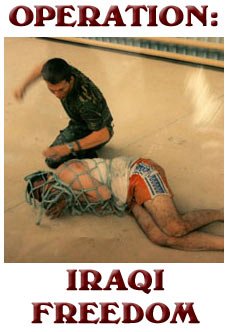τhε ṿαlε'ṡ lïlÿ;1399053 said:
and as I quoted before and the Iraqis themselves stated. Better to suffer of fever than die of it.. You are incredibly thick and I have to maddening a migraine today to spoon feed you common sense!
What are you saying?
Iraq under saddam the despotic mass murderer of your muslim brothers and sisters, is nothing more than a fever!
Doesn't paint a lovely picture does it?
Iraq under Saddam Hussein had high levels of torture and mass murder.
Secret police, torture, murders, deportations, forced disappearances, assassinations, chemical weapons, and the destruction of wetlands (more specifically, the destruction of the food sources of rival groups) were some of the methods Saddam Hussein used to maintain control.[
original research?] The total number of deaths related to torture and murder during this period are unknown, as are the reports of human rights violations. Human Rights Watch and Amnesty International issued regular reports of widespread imprisonment and torture.
Human rights organizations have documented government-approved executions, acts of torture, and rape for decades since Saddam Hussein came to power in 1979 until his fall in 2003.
In 2002, a resolution sponsored by the European Union was adopted by the Commission for Human Rights, which stated that there had been no improvement in the human rights crisis in Iraq. The statement condemned President Saddam Hussein's government for its "systematic, widespread and extremely grave violations of human rights and international humanitarian law". The resolution demanded that Iraq immediately put an end to its "summary and arbitrary executions... the use of rape as a political tool and all enforced and involuntary disappearances". Full political participation at the national level was restricted only to members of the Arab Ba'ath Party, which constituted only 8% of the population.
Iraqi citizens were not allowed to assemble legally unless it was to express support for the government. The Iraqi government controlled the establishment of political parties, regulated their internal affairs and monitored their activities. Police checkpoints on Iraq's roads and highways prevented ordinary citizens from traveling abroad without government permission and expensive exit visas. Before traveling, an Iraqi citizen had to post collateral. Iraqi women could not travel outside of the country without the escort of a male relative. The activities of citizens living inside Iraq who received money from relatives abroad were closely monitored. Halabja poison gas attack:The Halabja poison gas attack occurred in the period 15–19 March 1988 during the Iran–Iraq War when chemical weapons were used by the Iraqi government forces and thousands of civilians in the Iraqi Kurdish town of Halabja were killed. Al-Anfal Campaign:
In 1988, the Hussein regime began a campaign of extermination against the Kurdish people living in Northern Iraq. This is known as the Anfal campaign. The campaign was mostly directed at Shiite kurds (Faili Kurds) who sided with Iranians during the Iraq-Iran War. The attacks resulted in the death of at least 50,000 (some reports estimate as many as 100,000 people), many of them women and children. A team of Human Rights Watch investigators determined, after analyzing eighteen tons of captured Iraqi documents, testing soil samples and carrying out interviews with more than 350 witnesses, that the attacks on the Kurdish people were characterized by gross violations of human rights, including mass executions and disappearances of many tens of thousands of noncombatants, widespread use of chemical weapons including Sarin, mustard gas and nerve agents that killed thousands, the arbitrary imprisoning of tens of thousands of women, children, and elderly people for months in conditions of extreme deprivation, forced displacement of hundreds of thousands of villagers after the demolition of their homes, and the wholesale destruction of nearly two thousand villages along with their schools, mosques, farms, and power stations.




